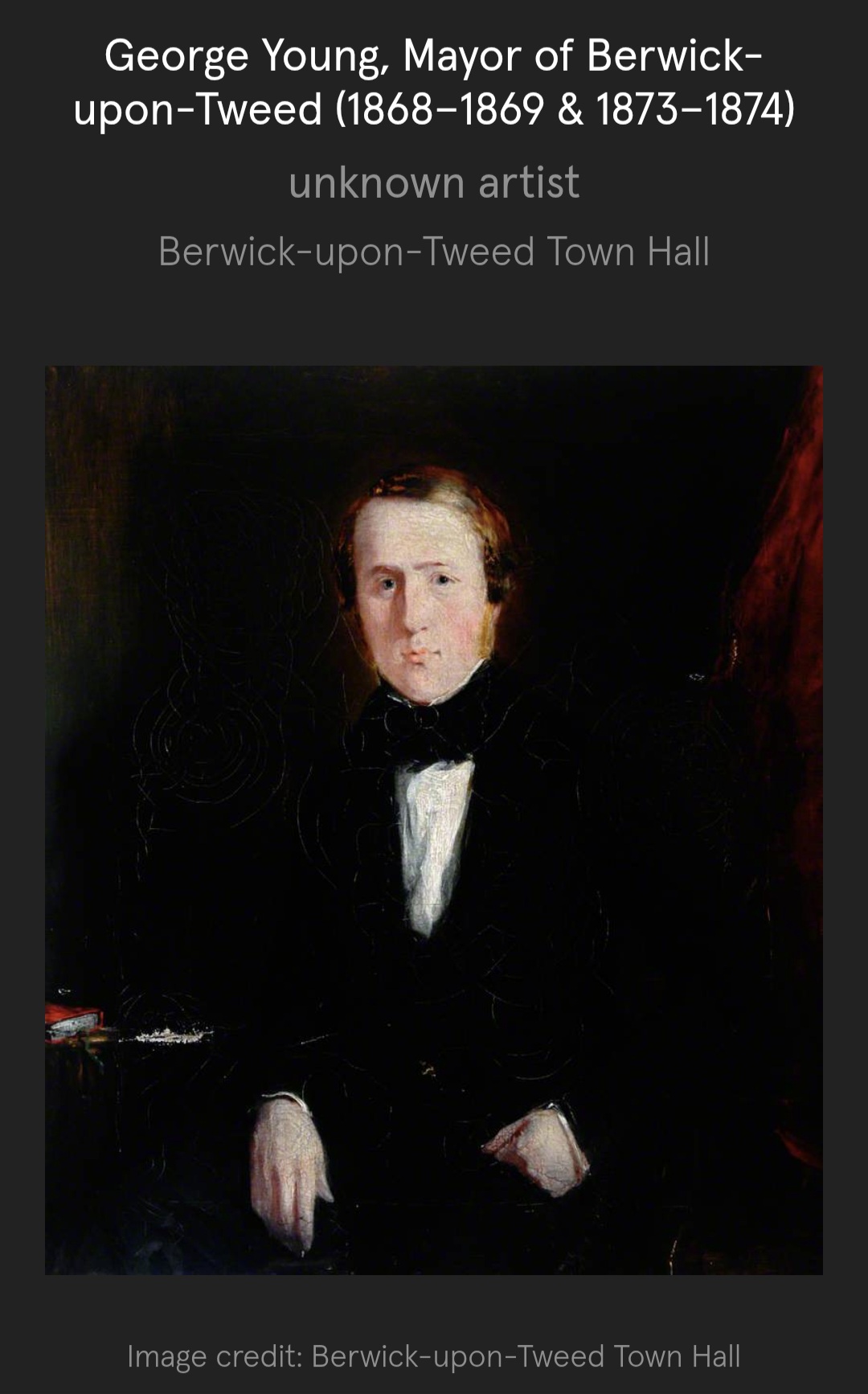George Young
George Young was Mayor of Berwick-upon-Tweed 1868-9 and 1873-4, and his portrait hangs in the Town Hall. He was a prominent member of the Church Street Church, and after he died in 1876, his widow commissioned the George Young Memorial Hall. This opened in 1884, and it is now the Main Hall of St. Aidan’s Hall.
According to the Berwickshire News and General, “Alderman Young had conducted a very successful business as fish merchant, etc, in Bridge Street, from which he retired only a few weeks before his death. He was for many years connected with the Town Council, to which he was first elected in Nov. 1858, and was Mayor in 1868.
“In a contest for the South Ward in 1870 he was defeated, and did not again appear in the Council till October 1873, when he was elected an Alderman. In November of that year he was again elected Mayor. He always discharged his duties in the Council faithfully and eloquently, and was very much esteemed. In politics he was a staunch Liberal, and supported his party to the utmost of his power. He was also Chairman of the Experimental Committee of the Tweed Commission, in which he took much interest, and was considered an authority on the natural history of salmon.”
The Berwick Advertiser, on the occasion of the opening of the hall dedicated to his memory, reported the Town Clerk, Mr. Douglas, as saying “he had known the late Ald. Young for many years. Upon an occasion similar to the present political struggle, that was in 1851 or 1852 when the grandfather of the present
Liberal candidate, Sir Edward Grey, was nominated for North Northumberland, his opponents were the present Duke of Northumberland then Lord Lovaine, and the present Earl of Tankerville then Lord Ossulston, Mr Young and he met at Sir George’s committee room and were very friendly in their disputes. He was a very keen and earnest politician and spared himself no trouble, working out what he thought was the right course. He might mention, to show the esteem and respect in which the late Mr Young was held, that some years afterwards he met Sir George Grey and was passing him by when the hon. baronet stopped him and said, “I think you are from Berwick?” He replied “Yes.” Sir George added—“Your name is Mr Douglas.” He answered again in the affirmative. Sir George then asked him if he knew his old friend Mr Young, and on being informed that he did, Sir George added—“Give my great respect and esteem to him.” Sir George Grey was defeated by a very small number of votes; some 30 or 40.
“After that the late Ald. Young and he became colleagues in the borough. He was a capital worker, wise counsellor and active canvasser. The Liberals were very much indebted to him for some of their victories. He simply alluded to that to show the respect and esteem in which the late Ald. Young was held by Lord Tweedmouth. He was only Sir Dudley Marjoribanks then. His lordship was passing through the town shortly after the death of Ald. Young, and, finding he had a couple of hours to spare, he went out to visit Mrs Young to express his sympathy and regret at her great loss. (Applause.) Mr Young was a member of the Town Council, an Alderman, Sheriff and twice Mayor—the highest honour his town could confer upon him. (Applause.) These were the simple facts with regard to his public capacity. In his private capacity he was a true and good friend, a capital neighbour, happy hearted, and enlightened in all his views. (Applause.) He was a man who read a great deal, was well versed in natural history and geology. His principal theological books were Adam Clarke and Matthew Henry; he knew these well. He was a very generous and liberal minded man. The only other point he would refer to was in connection with Church Street Church. He believed in 1835, in the time of the late Rev. Mr Young, the late Ald Young became a manager. The congregation knew better than he could possibly tell them, how earnestly and zealously he took an interest in all their affairs, how he adhered to them in all their vicissitudes and trials, through many of which they had gone together. He was one of the best workers that could possibly be got. Indeed one of the very last acts of his life was to appear before the Presbytery as one of the congregational commissioners to apply for a new pastor.”
